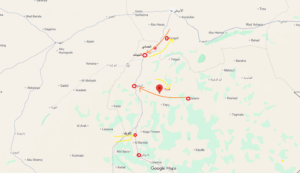Call to review Sudan procedures and laws that ensure legal abortion access for rape victims
A workshop focusing on legal abortion in Sudan has called for amendments to procedures and laws regarding rape victims’ rights to legal abortion, and suggests a raft of training courses for police, medical professionals, and members of the media, to increase awareness when dealing with victims of gender-based violence (GBV).
 File photo: Albert Gonzalez Farran - UNAMID
File photo: Albert Gonzalez Farran - UNAMID
A workshop focusing on legal abortion in Sudan has called for amendments to procedures and laws regarding rape victims’ rights to legal abortion, and suggests a raft of training courses for police, medical professionals, and members of the media, to increase awareness when dealing with victims of gender-based violence (GBV).
The two-day workshop, Legal Abortion Workshop, Reality, Challenges and Prospects, was organised in Khartoum last week by the Sima Centre for Training and Protection of Women and Children’s Rights, within the framework of the international 16-day campaign to combat GBV.
The outcomes of the workshop recommended that procedures be amended and better implemented, and demanded amendments to the Sudanese Procedures Code and the Public Health Law.
The two-day workshop witnessed in-depth discussions on the issue with the participation of the Ministries of Health and Justice, and senior obstetrics and gynaecologists. The participants of the workshop denounced the delays in legal procedures, including the issuance of Form 8, which guarantees a victim of violence and rape her legal and psychological rights.
They recommended conducting a package of training for police, medics, and media professionals, and providing psychological and legal support to victims of sexual violence. The workshop further announced the launch of a media campaign to advocate and address these challenges.
Nahid Jabrallah, lawyer and director of the Sima Centre, said in a press statement following the workshop that in particular Article 135 of the Sudanese Criminal Code, which gives women the right to abortion in case of fear for the health of the mother or the death of the foetus, was discussed.
There are practical difficulties, however, in applying this article which are related to slow procedures in the implementation of the right protecting rape victims to abortion. Jabrallah attributed this to “certain religious views” and “police staff and medical cadres evading responsibility for their tasks related to victims of rape”.
‘One of the cases required no fewer than 21 legal steps to implement the victim’s right to abortion, which is available for up to 90 days…’
Jabrallah said that she herself advised many rape cases. “One of the cases required no fewer than 21 legal steps to implement the victim’s right to abortion, which is available for up to 90 days.”
Lawyer Mohamed Jawda, Secretary of the Media Department of the Sudanese Bar Association, said that the applicable laws should be amended to include additional reasons for abortion, such as cases of foetal deformity. He also called for better measures to protect women after abortion, especially in cases of pregnancy resulting from rape.
Human rights defender Saad Mangala also mentioned practical problems in the implementation of the law and rights to abortion, especially in the bureaucracy of police and judicial procedures.
‘Every qualified doctor should how to deal with victims of rape…’
Gynaecologist Mina Nabil strongly advised a review of curricula on sexual violence in medical studies. “Every qualified doctor should how to deal with victims of rape.”
Nabil said at the workshop that the hospital in Khartoum where he works receives rape victims every week, and expressed his regret that “doctors do not even know how to prevent pregnancy for a rape victim”.
He pointed to a number of other complications related to dealing with rape cases, including the failure to train doctors on how to deal with evidence and take samples, check the possibility of pregnancy, and protect the victim from AIDS and other sexually transmitted diseases.











 and then
and then